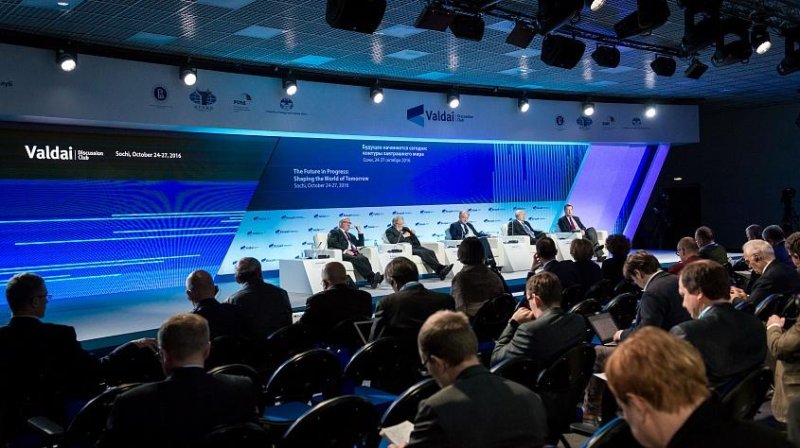Politicians and experts from 35 countries, including Russia, the United States, China, India and Australia are meeting in Sochi this week for the annual Valdai Discussion Club. Photo courtesy of Valdai Discussion Club
Politicians and experts from 35 countries, including Russia, the United States, China, India and Australia are meeting in Sochi through Thursday for the 13th annual gathering of the Valdai Discussion Club. The group meets every year at different locations in Russia to share views on the problems facing the global community today.
This year, participants have stressed the irreversibility of the changes currently taking place in world politics, predicting tectonic shifts in the global political order in the very near future.
During the first session of the meeting, John Mearsheimer, a professor of political science at the University of Chicago, said the current world order is going through a period of transformation, moving from a unipolar structure to a situation in which key issues depend not only on the United States but also on the political course of the two rising superpowers — Russia and China.
Such a situation will soon require leaders from all three countries to make key decisions in relation to the strategic courses of the others that will shape the future order of the global political landscape.
Time to make a choice
Mearsheimer says that a conflict between the United States and China is inevitable if Beijing's economic and political influence in Southeast Asia continues to grow. He adds that the foreseeable deterioration in U.S.-China relations will require Moscow to decide how to best align its interests.
"Russia has three choices: No. 1, they can ally themselves with the Chinese. No. 2, they can ally themselves with the U.S., which basically means joining in the balancing coalition against China. Or the Russians can remain neutral and play U.S. and China against each other," Mearsheimer said.
A Chinese government representative at Valdai categorically disagreed with the American expert, underlining that China is not seeking responsibility for supporting the world order.
"China views the U.S.-dominated world order as a mess and this is why it does not want to take over," said Fu Ying, chairperson of the Foreign Affairs Committee of the National People's Congress of the People's Republic of China. "Why should China repeat the mistakes which the U.S. did?"
Fu's words, however, did not convince Sergei Karaganov, dean of the faculty of world economy and world politics at the Higher School of Economics in Moscow. "Russia and China are changing and deconstructing the order that the U.S. has tried to impose after the Cold War. Russia is doing it powerfully, China — softly, in the Chinese style," Karaganov said.
Mearsheimer agreed with Karaganov that China is not completely pleased with the state of affairs in world politics. He thinks that the development of China's economic and military power will inevitably result in an intense competition between Washington and Beijing.
"The U.S. drove the Russians into the arms of the Chinese and there is no guarantee that the U.S. will be smart enough not to antagonize Russia further, pushing it to the Chinese," Mearsheimer said.
Europe in decline?
The Valdai Club experts question the role the European Union will play in the determining the new world order, mostly relegating it to the status of a supporting player largely dependent on decisions made by Russian, American and Chinese politicians.
In Mearsheimer's opinion, the EU's future will depend on how much Washington reorients its strategic interests toward the Pacific region.
Former Australian Prime Minister Kevin Rudd, who is currently the president of the Asia Society Policy Institute, agrees that Europe is losing its political significance in world processes, leaving the initiative to the United States, Russia and China.
The Valdai Club sessions conclude Thursday with an address from Russian President Vladimir Putin.
This article originally appeared at Russia Beyond the Headlines.















